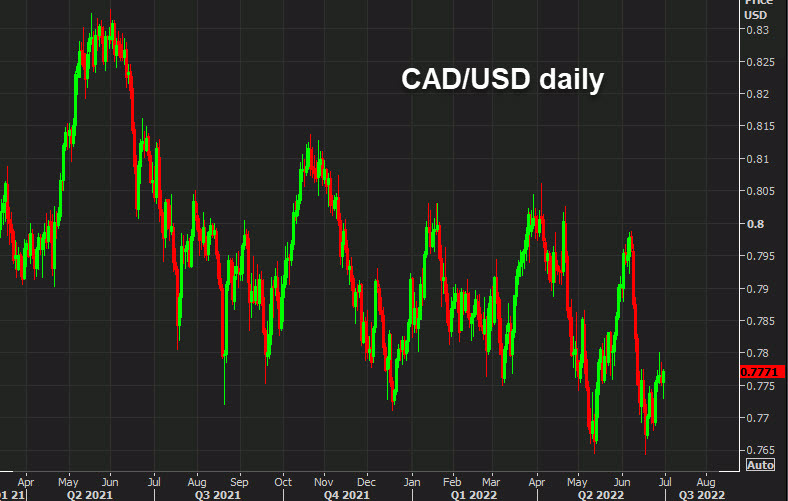The airwaves are filled with non-stop stories warning on global growth and a looming recession but you wouldn't no it from the Canadian dollar.
It's among the most growth-sensitive currencies in the world but it's also right near the top of the global pack. It's second only to the US dollar this year among major currencies and only narrowly behind.
The reason is that the Canadian dollar is caught in the cross-currents. Slowing global growth worries are justified and they are weighing on the loonie but it's being held up by other factors.
1) Canadian growth looks solid this year
Canada had a late exit from the pandemic. That took some growth from 2021 and pushed it into this year. The reopening of the Canadian economy has unleashed domestic demand at the same time global growth is slowing. Those trends though might converge after a summer splurge, leaving the loonie vulnerable in the autumn as the market shifts its focus to 2023.
With that the Bank of Canada has led the global rate hiking cycle and those rate differentials are an important support for the loonie.
2) Commodities vs everything else
There has been some real deterioration in global commodities and copper is at the lowest since Feb 2021 but energy is going strong. Even in commodities that has slipped, Canadian investment is looking more promising because of the war in Ukraine and blacklisting of Russia. There's also a complete re-think of LNG underway and that could add more than $100 billion in direct investment in Canada in the decade ahead.
The problem is that if commodity prices keep rising everything else will fall. Central banks have pitted themself in a deathmatch with inflation, meaning that even if the next round of inflation is commodity-driven, they'll tighten into a recession. That's a lose-lose and Canadian bulls would be wise to hope that oil and gas stay at these levels rather than taking another leg higher.
What happens next
We've been conditioned to see recessions as cataclysmic events. The past two were the financial crisis and the pandemic and those have left lasting mental scars.
We're likely headed into another recession but it will be a light recession and confined to financial assets, something like the dot-com bust. The combination of easy money and leverage goosed demand and pulled forward growth. We will fall back to trend and that's technically a recession but the jobs market will hold up.
The pain will be concentrated in financial assets that relied on cheap money -- tech stocks and real estate.
Fortunately Canadian markets largely trade at cheap valuations but I have major concerns about anything that's touching the housing market. We're going to find out how insulated the banks are and where the skeletons are buried. The international market hasn't turned its attention to Canadian housing yet because there's breathless talk about overvalued housing everywhere, but the Canadian bubble is the real deal and it's bursting.
As for USD/CAD, it will come down to rate differentials. Think of it as a race against your big brother. The BOC can hang with the Fed to about 3%, maybe 3.5%, but if big brother turns on the extra gear and hikes from there, the Bank of Canada can't keep on running, the housing market is too vulnerable.
I think the real global growth and real estate scare is still to come and we'll see 1.37-1.38 or 73-cents but I'm a bit more optimistic than a few weeks ago that inflation will moderate and the truly negative Canadian and global outcomes will be realized.

Europe is a disaster
Where investors need to absolutely steer clear is Europe. Almost nothing good is happening in Europe on the economic front. If you were to ask all the top politicians there to write down their top-10 priorities, strong economic growth and making a better environment for business would be lucky to make the list. They're willing to sacrifice the economic health of millions -- maybe hundreds of millions -- to punish Russia and build a United States of Europe. The business of the green transition and carbon capture will be enormous but Europe will lose on that too despite a massive headstart because it's being dictated from the top down and polluted by ideology rather than technology. The solutions will come from America and Asia just like they have in the entire tech industry. This decade will be the final nail in the idea of Europe as a source of global growth. The decline is terminal. The euro will see parity with the US dollar imminently and with the Canadian dollar within the decade.
